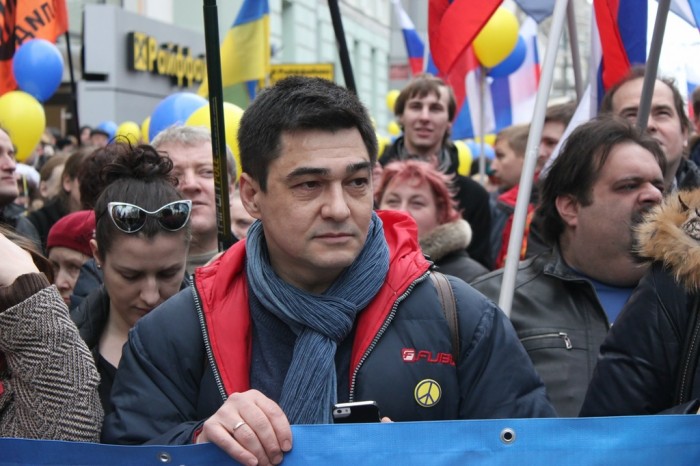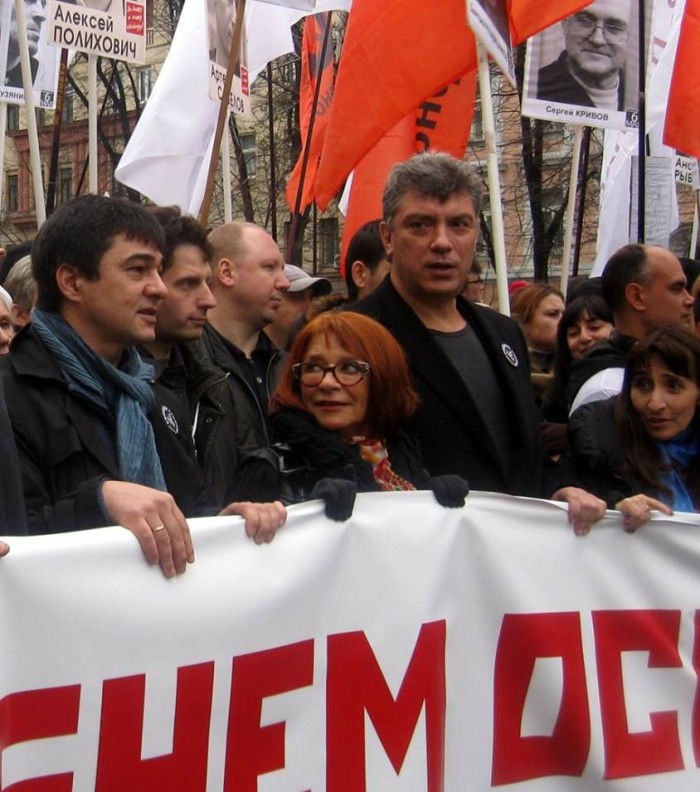- Published on Wednesday, 13 May 2015 12:32
- Category: Interviews
- Written by Sergei Davidis
An interview with Sergei Davidis, a Russian opposition politician and human rights activist. Interviewers: Iwona Reichardt and Bartosz Marcinkowski (New Eastern Europe)
NEW EASTERN EUROPE: You knew Boris Nemtsov personally. Who do you think was behind his killing?
SERGEI DAVIDIS: I am not ready to speak about who ordered Nemtsov’s killing as we still know too little at the moment. What we know for sure is that Nemtsov was a serious and influential opponent of the Vladimir Putin regime and Putin personally.
Now, it is being said that Nemtsov was not a real threat to Putin. It is true that he was not an electoral threat to Putin. There was no way he could ever beat Putin in elections. But the truth also is that Nemtsov was one of the most prominent figures opposing Putin – his Facebook profile was followed by more than 100,000 people. He posted a lot of things every day. He also prepared numerous reports and analyses which focused on such issues like the 2014 Winter Olympic Games in a sub-tropical climate, corruption, Gazprom and the outcome of the two first terms of Putin’s presidency. Millions of copies of these reports were spread and they were quite popular in Russia. Of course, it is clear that a report, like the last one which focused on Russia’s engagement in Ukraine, cannot change the situation in the country but it can increase awareness of the people.
Surely, Nemtsov could not organise any revolt but he was an elected member of the regional parliament in Yaroslavl Oblast. He won this seat in spite of having been demonised by the state-owned media and his involvement in the 1990s. Consequently, Nemtsov became a very important politician in this not so wealthy region and he also kept his position on the federal level. Nemtsov pursued very effective anti-corruption politics. Thanks to his actions, the corrupt vice-governor of this region was dismissed. This all shows that Nemtsov was not an absolute threat to Putin and his regime, but certainly he was effective in what he was doing. He was a critic of the regime. This is why, to some extent, Putin did benefit from Nemtsov’s murder. But we cannot say for sure that Putin personally ordered his assassination.
However, all the circumstances related to Nemtsov’s murder – including its site which is next to the Kremlin and constantly under surveillance of the Federal Security Service and the Presidential Security Service – lead us to the conclusion that the killers and the people who organised the assassination were somehow linked to some state bodies. We do not know which ones and on what level, but one thing is sure – it would have been impossible for the organisers to expect to not to be caught if they had not had any previous arrangement with Russian secret services. This is obvious.
As you know two Chechens – Zaur Dadayev and Anzor Gubashev – were detained. They claimed they were not sure whether they decided to kill Nemtsov on their own or whether somebody asked them to do so. They seem to be the true killers but because the Russian law enforcement agencies have a very bad reputation, nothing is sure. In Russia accusations can be completely fabricated. Even if it turns out that these two detainees are indeed involved in the crime, we have a reason to believe that they are not its organisers. In order to understand what I mean by saying this, you need to know the system of the Chechen society. First of all it is a tribal system where the youth still have to listen to the orders of the elderly. Second, Nemtsov’s alleged killers are part of the military and police services of the Chechen Republic, a half-independent structure within Russia. Thus, they should obey the orders of their commanders and Ramzan Kadyrov himself. All this information already suggests that it is impossible for two Chechens to spontaneously decide to kill Nemtsov, just because he said something bad about Islam or the Prophet Muhammad. They could not act independently. If they are guilty, it is because they got the order from the very top level Chechen officials – Adam Delimkhanov or Ramzan Kadyrov most likely, I do not know. They could want to comfort Putin in this tough time by killing his enemy.
Anyone who does something against Kadyrov in Chechnya will be either killed or imprisoned. Like Ruslan Kutayev, a Chechen human right activist who was arrested last year because he decided to organise a conference dedicated to the 70th anniversary of the deportation of Chechen people on February 23rd while Kadyrov had issued earlier an edict that the deportation anniversary should be marked not on the actual date (February) but in May. Kutayev was arrested under the bogus charges of possessing drugs.
What is the level of fear among Russian oppositionists today? Are many of them afraid of experiencing the same fate as Nemtsov? Are you personally afraid that something like this could happen to you?
Boris Nemtsov was a very high profile political figure. Also, when you think about this you see that his murder was actually the first political assassination of the opposition politician of such a high level since the killings of Anna Politkovskaya or Natalya Estemirova. Estemirova was a human rights defender in Chechnya where she was killed. It was quite uncommon that she managed to fight for human rights there for so long and remained alive. I do not believe I am so influential to be a target.
So you are not afraid?
We should be prepared for anything to happen but I estimate the possibility of being assassinated rather low. Nemtsov’s killing was a signal for the whole society. In my case it would not be such a remarkable event, so I think I am relatively safe.
What about other high profile oppositionists, like Kseniya Sobchak? Press reports say that she has also received death threats…
Clearly, the more important figure you are, the higher the risk. As we do not know exactly who was behind Nemtsov’s assassination, it is very difficult to evaluate it. We also do not know if it was just a one-time act or is it going to be systematic. Unfortunately, this event corresponded well with the atmosphere within the society which became very intolerant. We experience a lot of hatred in Russia now. Putin and his propaganda channels are to be blamed for that. It is much more difficult to imagine that Nemtsov would have been murdered before the annexation of Crimea.
How would you evaluate the state of the opposition in Russia in general? There are some movements, parties and politicians but they all seem to be rather fragmented. Is there any chance that the opposition in Russia will unite one day?
The opposition in Russia is at an early stage. There are some movements which have been active during the whole time Putin has ruled. They became stronger in 2011 and 2012 but the situation worsened last year, especially after the annexation of Crimea. Before that, we were able to act together. Not only the liberal, pro-European part of the opposition but also some moderate nationalists or some politicians from the left like Sergei Udaltsov.
Nearly all the liberal forces stayed against Putin and did not accept his actions in Ukraine. A big part of the left and the nationalists which were once anti-Putin supported the annexation and the opposition split. We then took several steps back in our political development and on the way to democracy. We do not have expectations to win elections any time soon. Everyone understands now that it is impossible to change the rulers of our country by means of elections. We will try to participate in the parliamentary elections in 2016. We should try to act together, but it is not the only condition of effectiveness of the movement.
What is the social support for the opposition?
First we need to analyse the results of the polls which give Putin 85 per cent support. These surveys are misleading. In Moscow it is well known that more than a half of potential respondents refuse to answer the questions. We have no reason to believe that their position is the same as the position of people who answer these questions. It has also been proved by sociological research that in a situation like the hysterical mobilisation as we have in Russia now people who do not agree with the mainstream thinking do not want (or are afraid) to answer such questions. And those who agree do it proudly, proudly as they feel they are part of a very large force. They agree to answer the pollsters’ questions even if they would refuse to do so earlier. This means that the ratio of opinions is distorted and there are people who claim that they support Putin even if they really do not.
In fact, the scale of support for Putin looks rather this way: 70 per cent supports Putin and 30 per cent supports the opposition. Another thing is the quality of this support. Rallies against Putin in Moscow gather between 30,000 to 50,000 people. Meanwhile, similar rallies supporting Russia’s aggression in Ukraine, organised without state support, are usually attended by 1,000 to 2,000 people. And a rally organised by the state in fact can gather as many people as the opposition rallies do, or even slightly more. But most of their participants are either paid for participation or ordered to come. People also cannot see any alternative on television.
People in Russia are afraid of changes, their support for Putin is not based on admiration, “Putin is our god, how could we live without him?” but it is rather related to a “let it be” attitude. They are afraid that someone new in power, someone they do not know, can be worse. Reports on Ukraine after the overthrow of Yanukovych also send a message: “See what has been going on in Ukraine since the revolution? See the destroyed cities and dead soldiers? Do you really want that here in Russia?”
Sergei Davidis is a Russian opposition politician and human rights activist. He is a member of Federal Political Bureau of Russian “Solidarity” movement, co-founder of unregistered Party December 5th and a member of Memorial.
Iwona Reichardt is deputy editor-in-chief of New Eastern Europe. She holds a PhD in political science.
Bartosz Marcinkowski is an Assistant Editor with New Eastern Europe.
http://www.neweasterneurope.eu/interviews/1583-in-russia-nothing-is-certain


